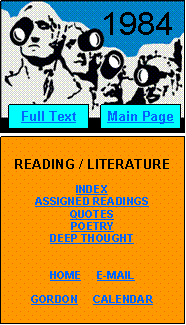|
Novelists: Agent of change in language and thought Novelists, being neither poets nor philosophers, rarely originate modes of thinking and expression. Poets such as Chaucer and Shakespeare have had much to do with the making of the English language, and Byron was responsible for the articulation of the new romantic sensibility in it in the early 19th century. Books like the Bible, Karl Marx's Das Kapital, and Adolf Hitler's Mein Kampf may underlie permanent or transient cultures, but it is hard to find, except in the early Romantic period, a novelist capable of arousing new attitudes to life (as opposed to aspects of the social order) and forging the vocabulary of such attitudes.With the 18th-century precursors of Romanticism--notably Richardson, Sterne, and Rousseau--the notion of sentiment entered the European consciousness. Rousseau's Nouvelle Héloïse fired a new attitude toward love--more highly emotional than ever before--as his Émile (1762) changed educated views on how to bring up children. The romantic wave in Germany, with Goethe's Sorrows of Young Werther (1774) and the works of Jean-Paul Richter a generation later, similarly aroused modes of feeling that rejected the rational constraints of the 18th century. Nor can the influence of Sir Walter Scott's novels be neglected, both on Europe and on the American South (where Mark Twain thought it had had a deplorable effect). With Scott came new forms of regional sentiment, based on a romantic reading of history.It is rarely, however, that a novelist makes a profound mark on a national language, as opposed to a regional dialect (to which, by using it for a literary end, he may impart a fresh dignity). It is conceivable that Alessandro Manzoni's I promessi sposi (1825-27; The Betrothed), often called the greatest modern Italian novel, gave 19th-century Italian intellectuals some notion of a viable modern prose style in an Italian that might be termed "national," but even this is a large claim. Günter Grass, in post-Hitler Germany, sought to revivify a language that had been corrupted by the Nazis; he threw whole dictionaries at his readers in the hope that new freedom, fantasy, and exactness in the use of words might influence the publicists, politicians, and teachers in the direction of a new liberalism of thought and expression.It is difficult to say whether the French Existentialists, such as Sartre and Albert Camus, have influenced their age primarily through their fiction or their philosophical writings. Certainly, Sartre's early novel Nausea (1938) established unforgettable images of the key terms of his philosophy, which has haunted a whole generation, as Camus's novel The Stranger (1942) created for all time the lineaments of "Existential man." In the same way, the English writer George Orwell's Nineteen Eighty-four (1949) incarnated brilliantly the nature of the political choices that are open to 20th-century humanity, and, with terms like "Big Brother" (i.e., the leader of an authoritarian state) and "doublethink" (belief in contradictory ideas simultaneously), modified the political vocabulary. But no novelist's influence can compare to that of the poet's, who can give a language a soul and define, as Shakespeare and Dante did, the scope of a culture. |
